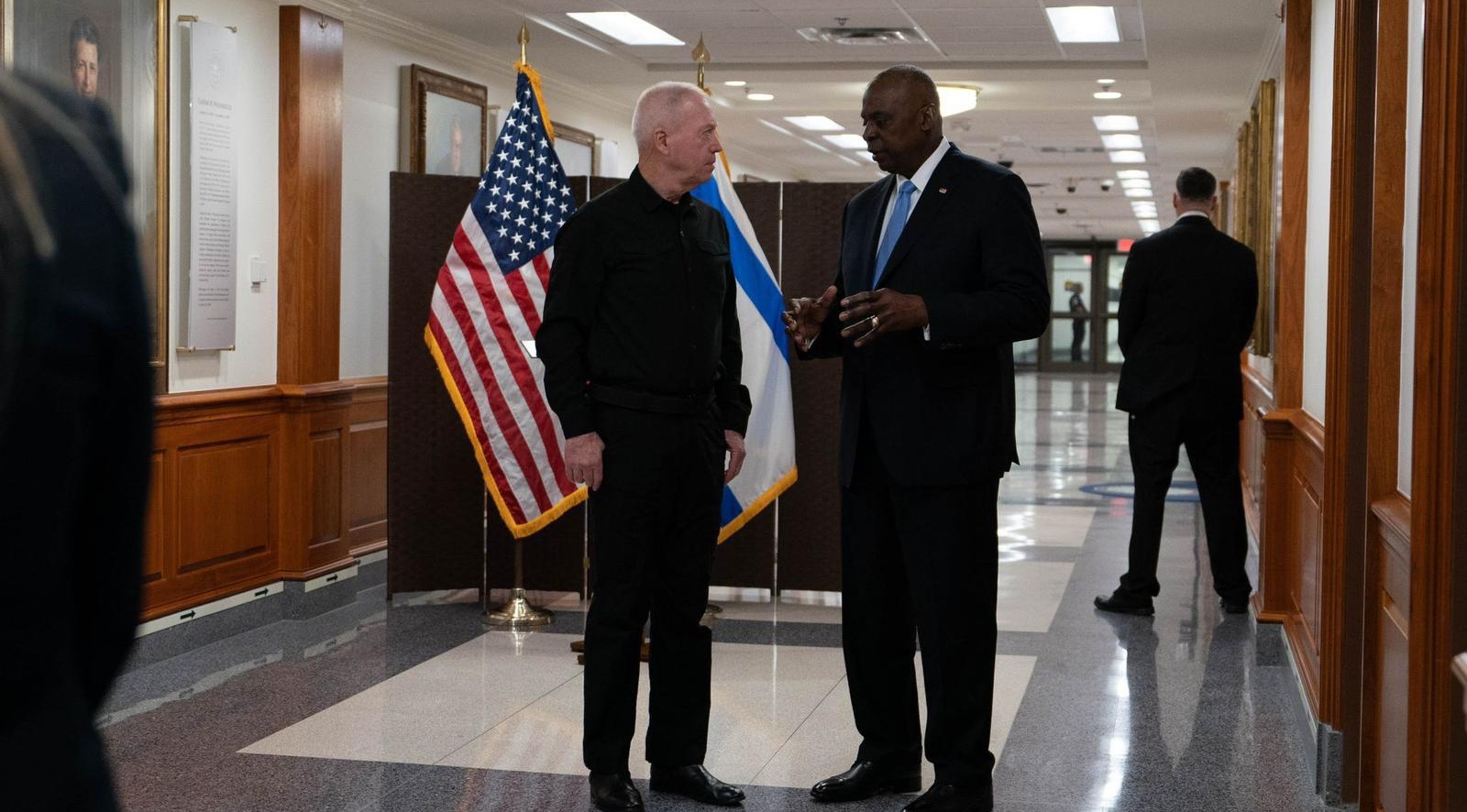Netanyahu’s firing of Gallant is a cynical betrayal of Israel’s security
Political calculations guided a decision that will now endanger the country

Israeli Defense Minister Yoav Gallant, left, chats with U.S. Defense Secretary Lloyd Austin in the Pentagon, June 25, 2024.
In the life of a nation — or a family, or an institution or business venture — there are rare moments when you can almost hear the sound of something breaking. Prime Minister Benjamin Netanyahu’s abrupt firing of Defense Minister Yoav Gallant is one such moment, a shameless political machination that reverberates with a profound sense of cynicism and portent. Gallant’s removal from office comes at a time of extraordinary security challenges, with Israel teetering on the edge of external conflict and internal division.
Gallant’s dismissal happened precisely as Israel prepares for a potential retaliatory attack from Iran. Some intelligence assessments warned that Iran, cautious about inadvertently bolstering Donald Trump’s election campaign, has been strategically biding its time, potentially planning an attack as soon as U.S. polls close.
The fact that Netanyahu would oust his defense minister — a man who had given years of service to Israel’s security — at the very moment when Israel is preparing for potential Iranian aggression, has sent shockwaves through the country. Tens of thousands took to the streets all over the country, and preparations were underway for sustained protests.
Gallant, a respected former Israel Defense Forces general with deep experience, is central to Israel’s preparations for this looming confrontation. Moreover, as the sole pragmatist and moderate in Netanyahu’s extraordinarily unpresentable government, he is the diplomatic link with Washington at a time when the Biden administration has been actively engaged in trying to de-escalate tensions in the region. He will be replaced by Foreign Minister Yisrael Katz, an apparatchik whose diplomatic profile is barely felt and high-level security background is nil.
Gallant’s role has been pivotal in two delicate negotiations involving Lebanon and Gaza — both mediated by the United States. The first deal involves a fragile understanding that could compel Hezbollah to withdraw from Israel’s northern border, significantly reducing the threat of rocket fire and invasion. The second negotiation concerns the return of Israeli hostages held by Hamas in Gaza.
In a measured tone, Gallant addressed the Israeli people three hours after his firing was announced, stressing the importance of pursuing “painful compromises” to achieve an end to the Gaza war, underscoring that the needed concessions, while difficult, are bearable in the interests of reuniting families with their loved ones.
“There can be no forgiving the abandonment of the hostages,” Gallant said, calling Israel’s previous inaction a “mistaken path.”
It is hard to overstate the anger many Israelis — probably a majority — feel about the indifference Netanyahu’s government has projected toward the fate of the hostages. There is no question that Hamas’ demands — essentially that Israel end the war — are difficult. But there was much that Israel could have done to change the equation, including to give the negotiators ammunition by agreeing to the obvious day-after plan of restoring the Palestinian Authority to power in Gaza instead of Hamas. Netanyahu has proven more interested in preserving his coalition, which means pacifying its far-right component, which wants to forever rule Gaza, compel the Palestinians to somehow leave, and settle the strip with Jews.
Moreover, the cause of Gallant’s firing has little to do with security concerns and everything to do with domestic politics. Gallant’s dismissal centers on his vocal opposition to a planned law formalizing draft exemptions for ultra-Orthodox (Haredi) men, a measure demanded by Netanyahu’s ultra-Orthodox coalition partners. Gallant, a champion of universal military service, had called the law “non-egalitarian and corrupt,” articulating the sentiments of many Israelis who view mandatory service as a fundamental, unifying obligation.
“Everyone who is in the age of conscription should be eligible for conscription. This is the most central issue for our security and future. We lost many hundreds of fighters,” Gallant said in his address. “In these circumstances, there is no choice. Everyone needs to serve in the military.”
For decades, the Haredi exemption has been a sore point, a source of mounting resentment among the secular and national-religious Israeli communities who shoulder the defense of the country. While the ultra-Orthodox argue that religious study constitutes a form of national service, the majority of Israelis see the exemption as an abuse of privilege, particularly at a time when Israel’s security situation demands unity and sacrifice.
In his speech, Gallant also struck a nerve by calling for a national commission of inquiry into the debacle of Oct. 7 — a position that projects integrity, because such a commission is very likely to be harsh with everyone in a position of security responsibility on the day when 1,200 people were massacred in Israel. That stands in extraordinary contrast with Netanyahu, who has been fighting tooth and nail to prevent any accounting for the failure – indeed hoping to drag things out long enough, and complicate matters enough, that somehow his culpability might be forgotten by enough people so as to enable him to cling yet more to power.
Netanyahu’s coalition, while claiming a nationalist mantle, is compromising the country’s security by undermining one of its core pillars: the IDF as a symbol of equality and unity. The Haredi draft exemption threatens to tear at the social fabric of Israel, feeding into divisions that weaken the national resolve.
And the prime minister is certainly personally beleaguered. His corruption trial grinds on, and he is expected to testify on Dec. 3. The International Criminal Court is considering an arrest warrant against him. And his office is embroiled in yet another scandal, with a key aide arrested in recent days on charges of leaking classified documents.
By prioritizing short-term political gains, Netanyahu has isolated Israel at a time when it needs its allies most. The cynicism is too extreme, and the results potentially dire.














